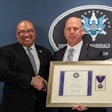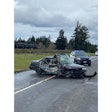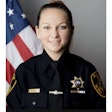Air marshals, passenger screeners, and state police have undergone special training in what behaviors to look out for. Rafi Ron, former head of security at Israel’s Ben Gurion Airport trained Logan’s state troopers. Israel has used similar screening programs for years.
A score sheet helps passenger screeners determine when to notify an officer about a specific individual. If a person meets a certain number of suspicious characteristics on the behavior list, an officer will be asked to approach him or her. Air marshals, as well as uniformed and undercover security officials, also scan the crowd in the airport for unusual behavior.
“They’re looking for something outside the normal range of behavior,” says Jack Shea, special agent in charge of the federal air marshals in Boston. “What I like about it, it’s very basic, it’s common sense, it’s effective, it works.”
The American Civil Liberties Union isn’t convinced of the program’s effectiveness, nor of its legitimacy, worried such screening will lead to racial profiling.
But some privacy advocates prefer this type of program to running background checks on all airplane passengers to detect possible terrorists.
Rep. John Mica, a Republican from Florida and chairman of the House aviation subcommittee, feels behavior pattern recognition puts the correct emphasis on keeping suspicious people off of planes instead of specific items.











